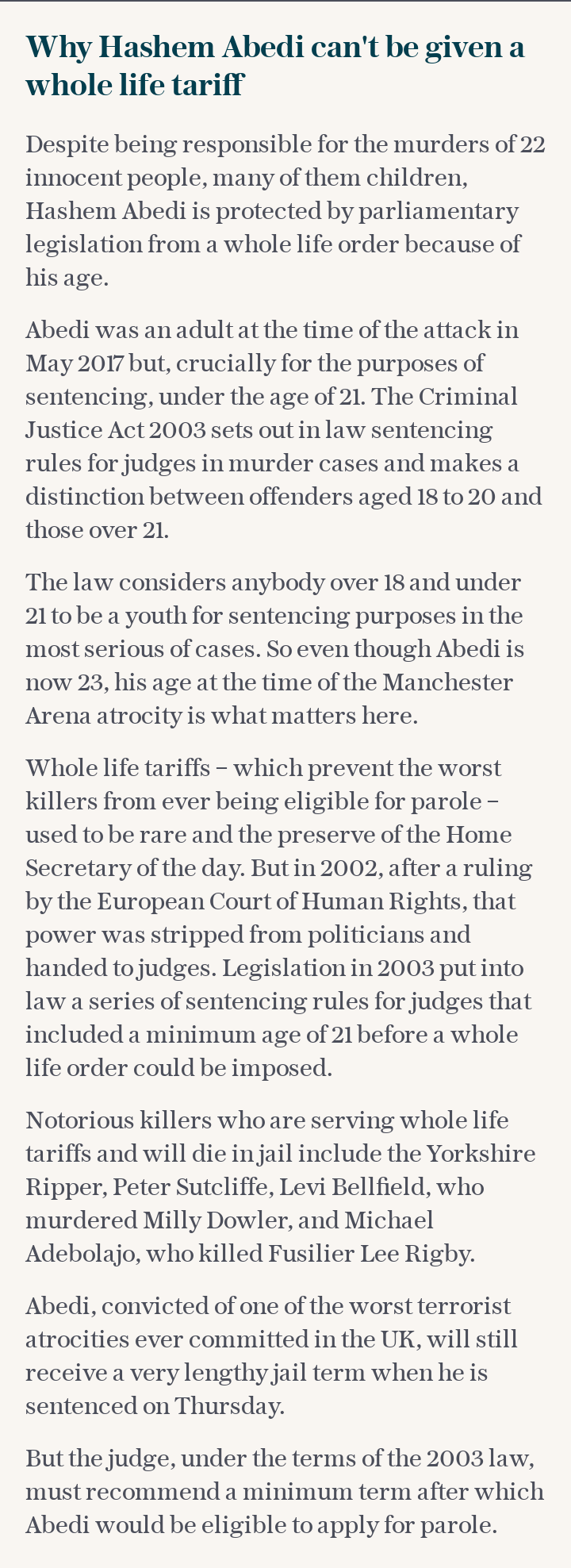Manchester bomber will escape whole life sentence because judge's hands are tied

A senior judge said on Wednesday that he was powerless to send the terrorist behind the Manchester Arena bombing to jail for the rest of his life because of laws passed by Parliament.
Hashem Abedi will escape a whole life sentence for the atrocity because he was aged 20, rather than 21, at the time of the attack. The law prevents criminals under 21 being handed a whole life term.
In March, Abedi, now 23, was found guilty of murdering 22 people for his part in the arena bombing. It was carried out by his brother, Salman Abedi, who detonated a bomb in a backpack on May 22, 2017 and died in the attack.

At the start of a two-day sentencing hearing at the Old Bailey, Mr Justice Jeremy Baker said: "The reality is that if the accused had been over the age of 21, as was his brother, who of course died in the incident, then it would be the prosecution's case that this was a case where a whole life order was appropriate."
Mr Justice Baker said the court was "precluded" from passing the whole life sentence, adding: "It is a matter not at the court's discretion… but a matter for Parliament, which passed the legislation to prevent the court from passing a whole order in this case."
It is thought to be the first time an adult prisoner has been able to avoid a "life means life" sentence, reserved for Britain's most notorious murderers, because he was under 21.
Mr Justice Baker's remarks came as relatives of the victims of the bombing, planned by Abedi and his brother, told how their lives had been irreparably altered.

Before their impact statements were read out, prosecutors admitted in court that it would be "unlawful" to keep Abedi in jail until he dies under the terms of criminal justice legislation dating back to 2003. Duncan Penny QC, the prosecutor in the case, said: "If your Lordship were to pass such a sentence, it would be an unlawful one."
The loophole was condemned on Wednesday by a former Home Secretary and an ex-Metropolitan Police commissioner, who both asked why Abedi – an adult at the time of the attack but under 21 by a few months – had avoided a whole life tariff.
Instead, the judge will have to set a minimum jail term – likely to be very lengthy – after which Abedi will be eligible to apply for parole.
Former Met commissioner Sir Paul Stephenson said: "Parliament should think again about this legislation. It is a nonsense that Abedi should be eligible for parole just because he was 20 rather than 21. This is not a criticism of the judge, because that is the letter of the law – and the law needs to be rethought."

Lord Blunkett, the Home Secretary when the Criminal Justice Act 2003 was introduced, said he had no recollection of the provision, adding that his legislation had been intended to take a tougher approach to criminal justice.
"Twenty-one has no logic because it doesn't have any legal basis at all. You reach adulthood at 18 and ought to be treated as such," he told The Telegraph. "I have the view that adults are adults, and whatever the logic and justification was way back then, it doesn't ring a bell in terms of the logic and rationality to me now."
Mr Blunkett said there was a valid argument for under-18s to be treated separately, as was the case with the killers of Jamie Bulger.
Asked to explain the precedent for setting the age at 21 in the 2003 Act, the Ministry of Justice said on Wednesday night that it was investigating but noted that a criminal or terrorist handed a life sentence, rather than a whole life order, could still be held in prison subject to decisions by a parole board.
"You could end up in prison for life because it would be up to the parole board to decide. It doesn't mean someone will be definitely released," said a senior Government source.
It is understood that Robert Buckland, the Justice Secretary, is taking a close interest in the Abedi case and the implications of the age limit of 21. Mr Buckland is currently preparing a white paper which is expected to toughen sentencing across a range of offences from murder to burglary.
The judge will sentence Abedi on Thursday. Speaking ahead of the hearing, Figen Murray, whose 29-year-old son Martyn Hett was among the victims, said: "I trust the British legal system. Whatever the judge gives this person will be just punishment for a crime he committed."

In court on Wednesday, victims' families told of their grief and the impact that the Arena attack has had on their lives.
Abedi refused to leave his cell and attend court to hear their heartbreaking testimony.
Claire Booth, the sister of 32-year-old victim Kelly Brewster, broke down as she recalled how "helpless" she had felt on the night her sister died "alone on the cold floor" of the Arena.
The father of Georgina Callander, 18, said he now "longs for the day" when he can "join my little girl again" to "grab hold of her and never let her go".
The parents of teenage victims Chloe Rutherford and Eilidh MacLeod said their daughters' deaths still do not feel real three years on. Chloe's mother said there is "always an empty chair" at the family dinner table, while Eilidh's family said they have to stop themselves from calling her to come to dinner each night.
At his trial, the court heard that Abedi, inspired by Islamic State, helped his brother to order, collect and store the materials needed for the plot to detonate a bomb at an Ariana Grande concert.


